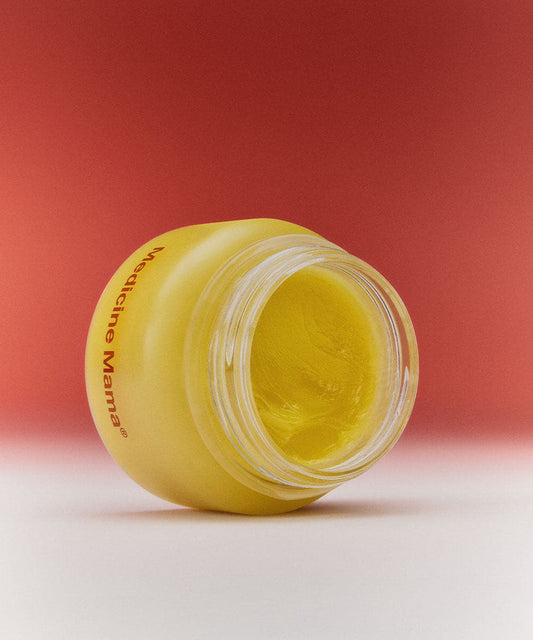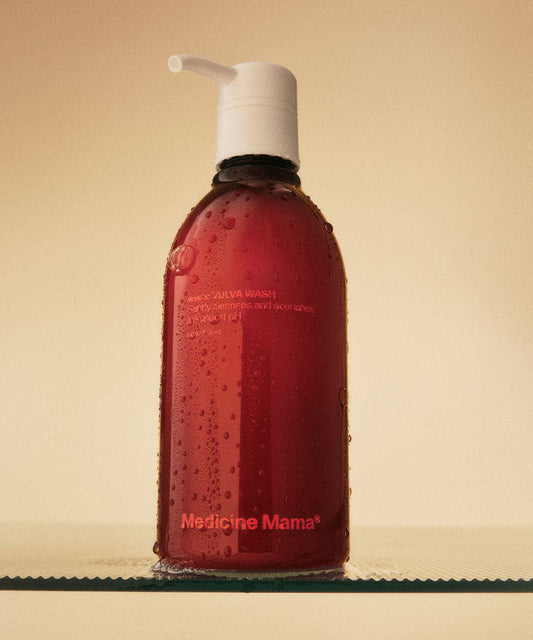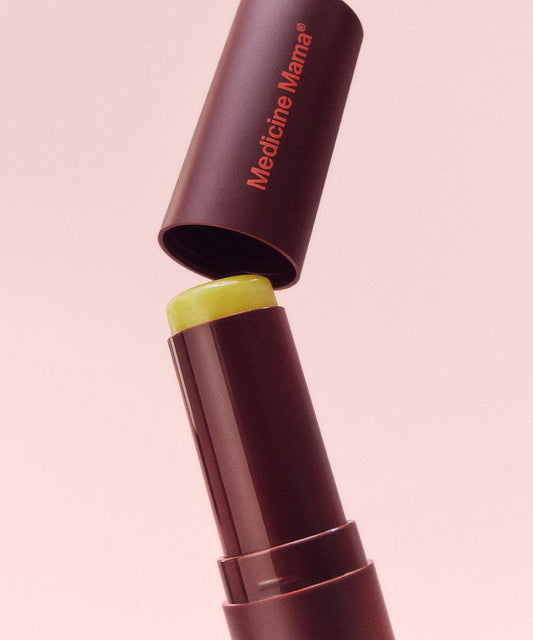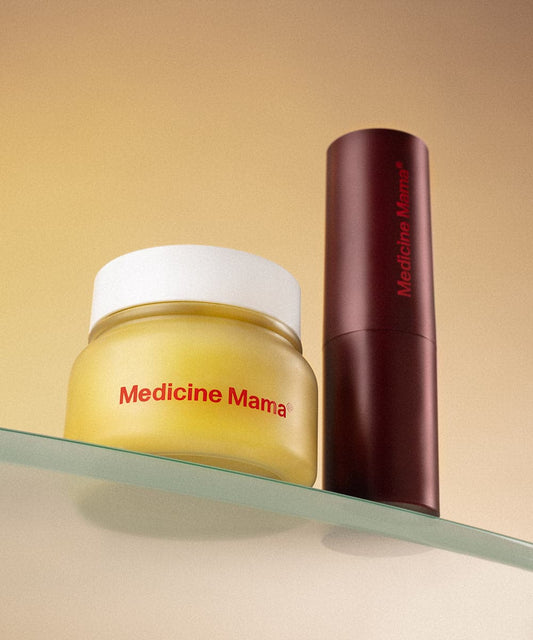
Reviewed by | Melinda (Melle) Hany, RN, ADN Registered Nurse
If sex has gone from “yes, please” to “ouch, what just happened?” you’re not alone. Sudden discomfort in the bedroom can be confusing, frustrating, and, yeah, a little uncomfortable to talk about. But at Medicine Mama, we’ve heard it all before. And trust us, it’s more common than most people realize.
Whether it’s a recent dry spell, a hormonal shift, or just a little too much stress creeping into your relationship, there’s usually a reason and a way to get back to feeling good.
Decreased Estrogen and Vaginal Dryness
One of the most common shifts during perimenopause and menopause is a drop in estrogen, and with it, a drop in natural lubrication. That sudden dryness can make sex feel scratchy, tight, or even painful. The vulva and the skin around the vaginal opening lose some of their softness and stretch, so friction hits differently.
This isn’t something you need to just deal with. Moisturizing intimate skin regularly can help maintain comfort and support your body as it changes.
Our VMAGIC® Vulva Balm was made exactly for this — an organic, hormone-free moisturizer that soothes dryness, calms irritation, and helps keep vulvar skin soft and comfortable. Use it daily, or whenever things feel off.
Thinning Skin and Tissue (Vaginal Atrophy)
With less estrogen, it’s not just dryness that shows up — your skin itself can change. The tissue around the vulva and vaginal opening can become thinner and more fragile, which means it’s more prone to microtears or soreness during sex. This is called vaginal atrophy, and while it sounds intense, it’s extremely common and often overlooked.
You might notice things feel more sensitive, irritated, or raw after sex, even if it wasn’t rough. Moisture and gentle care go a long way here, but it’s also worth checking in with a provider who understands the difference between vulvar skin and vaginal tissue. The more support you give the area, the more comfortable intimacy can feel again.
Pelvic Floor Tension or Tightness
Sometimes the issue isn’t hormones — it’s muscles. The pelvic floor is a group of muscles that support your bladder, bowel, and reproductive organs, and they’re supposed to relax during sex. But when they don’t? That’s when things get painful.
You might feel a burning sensation, sharp pressure, or a sense that penetration just won’t happen, no matter how ready you are. This kind of muscle tension can be triggered by stress, trauma, certain medical conditions, or even anticipating pain from past experiences.
It’s frustrating, but it’s also something you can work on. A pelvic floor therapist can help assess what’s going on and teach you techniques to help those muscles relax, so sex doesn’t feel like a fight with your own body. Melinda Hany, Registered Nurse, adds, “Plus, a healthier pelvic floor can also mean less of a likelihood of bladder leakage!”
Reactions to Products or Ingredients
Ever feel a little off after trying a new product? It’s not just in your head. Some washes, lubricants, or even condoms contain fragrance, drying agents, or harsh surfactants that can disrupt the delicate skin barrier.
For something as sensitive as the vulva, it can lead to irritation, sensitivity, or an uncomfortable reaction that shows up when things heat up. That’s why we always recommend using products designed specifically for vulvar skin.
Our VMAGIC® Vulva Wash is a gentle, fragrance-free cleanser that nourishes and supports the pH of your vulva without leaving behind residue or drying ingredients. It’s made for daily use, especially for sensitive skin that’s been through enough already.
Lack of Arousal or Foreplay
There’s no shortcut to readiness. As we age, our bodies may need more time and more stimulation before sex feels good.
When there isn’t enough mental or physical buildup, the vulva and vaginal opening may not get the blood flow and natural lubrication they need to respond comfortably. That can make things feel tight, off, or even painful.
This has nothing to do with performance and everything to do with connection — to yourself, your body, and what turns you on. It’s okay to take your time. In fact, it’s necessary. Your body’s doing exactly what it’s supposed to do; it just needs a little more support to get there.
Postpartum Recovery
Your body just did something huge — and it’s going to feel different for a while. After childbirth, hormone levels drop, tissue may still be healing, and breastfeeding can lead to lower estrogen, which often means dryness and sensitivity.
Whether you had tearing, stitches, or just feel like things aren’t back to “normal” yet, sex might feel sore, raw, or totally off the table for a bit. That’s not a failure. That’s a phase. And you deserve tools that meet you where you are — like our VMAGIC® Lips Stick.
It’s the same hormone-free, vulva-friendly moisturizer as our best-selling balm, but in a discreet swipe-and-go stick that’s perfect for quick relief between feedings, in your diaper bag, or when you just don’t have two hands free. Because postpartum life doesn’t pause, and neither should your comfort.
Infections or Imbalances
If sex has started to sting, burn, or just feel off, your body might be trying to tell you something. Yeast overgrowth, bacterial imbalances, or urinary tract issues can cause irritation that flares during intimacy. Other signs might include itching, changes in discharge, or a scent that feels unfamiliar.
It’s easy to jump to conclusions — or ignore it altogether — but this is a good time to check in with a provider. You don’t need to self-diagnose or spiral. Just notice what’s changed, get curious, and get support.
Emotional or Psychological Factors
Let’s be honest, sex is never just physical. Your brain plays a role, and sometimes it doesn’t make things easy. Stress, anxiety, relationship tension, or past experiences that felt unsafe can all show up when you least want them to. Clenching, discomfort, pulling away — it’s a thing.
You’re not broken. You’re not being dramatic. Bodies respond to more than just touch. Talking to someone — a therapist, a sex therapist, someone who actually gets it — can help untangle some of that. So can giving yourself space, patience, and a reminder that it’s okay to need support. You deserve to feel good in your body again.
When It’s Time To Hit Pause and Call Your Provider
Not everything requires a doctor’s visit, but some things do. If sex is suddenly painful and stays that way, or if you’re noticing sharp, deep pain that doesn’t shift with lube, arousal, or position, it’s worth getting checked out. Same goes for bleeding that isn’t period-related, pain that lingers well after sex, or anything that just feels like a hard no from your body.
You know your body better than anyone. If something feels off and isn’t getting better with simple at-home support, listen to that voice in your head that says, “This doesn’t feel right.” That’s not overthinking. That’s you being in touch, and that matters.
The Bottom Line
So, why exactly does sex suddenly hurt? It could be dryness. It could be tension. It could be your wash, your hormones, your headspace — or a mix of all of it.
That’s the thing about bodies: they’re constantly changing. And when something starts to feel different, it’s not something to ignore or “tough out.” It’s something to explore with curiosity, care, and zero shame.
At Medicine Mama, we believe support should be straightforward. That’s why we make products designed for the vulva — with clean, gentle ingredients and no guesswork. Whether you’re navigating perimenopause, postpartum, or just trying to reconnect with your body, we’re here to help you feel more in touch with yourself, your skin, and your sex life.
You deserve comfort. You deserve care. You deserve to feel good again. Let’s start there.
Sources:
Low Estrogen: Causes, Symptoms, Diagnosis & Treatment | Cleveland Clinic
Vaginal atrophy - Symptoms & causes | Mayo Clinic



